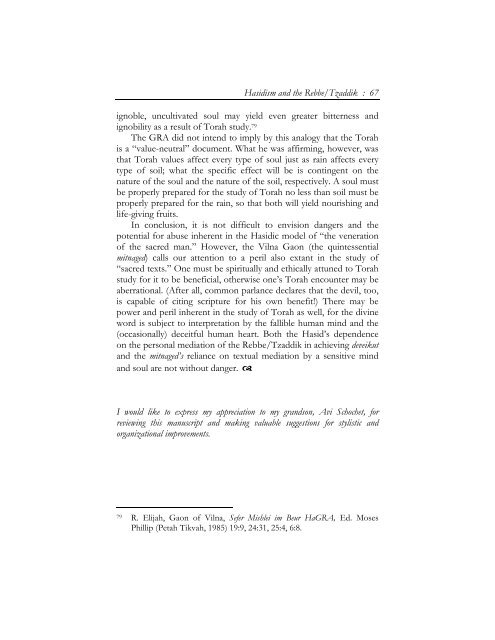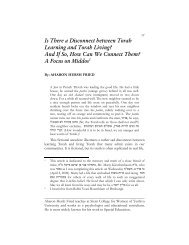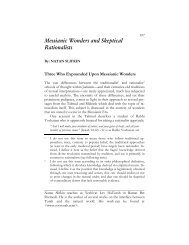Hasidism and the Rebbe/Tzaddik: The Power and Peril of ... - Hakirah
Hasidism and the Rebbe/Tzaddik: The Power and Peril of ... - Hakirah
Hasidism and the Rebbe/Tzaddik: The Power and Peril of ... - Hakirah
You also want an ePaper? Increase the reach of your titles
YUMPU automatically turns print PDFs into web optimized ePapers that Google loves.
<strong>Hasidism</strong> <strong>and</strong> <strong>the</strong> <strong>Rebbe</strong>/<strong>Tzaddik</strong> : 67<br />
ignoble, uncultivated soul may yield even greater bitterness <strong>and</strong><br />
ignobility as a result <strong>of</strong> Torah study. 79<br />
<strong>The</strong> GRA did not intend to imply by this analogy that <strong>the</strong> Torah<br />
is a “value-neutral” document. What he was affirming, however, was<br />
that Torah values affect every type <strong>of</strong> soul just as rain affects every<br />
type <strong>of</strong> soil; what <strong>the</strong> specific effect will be is contingent on <strong>the</strong><br />
nature <strong>of</strong> <strong>the</strong> soul <strong>and</strong> <strong>the</strong> nature <strong>of</strong> <strong>the</strong> soil, respectively. A soul must<br />
be properly prepared for <strong>the</strong> study <strong>of</strong> Torah no less than soil must be<br />
properly prepared for <strong>the</strong> rain, so that both will yield nourishing <strong>and</strong><br />
life-giving fruits.<br />
In conclusion, it is not difficult to envision dangers <strong>and</strong> <strong>the</strong><br />
potential for abuse inherent in <strong>the</strong> Hasidic model <strong>of</strong> “<strong>the</strong> veneration<br />
<strong>of</strong> <strong>the</strong> sacred man.” However, <strong>the</strong> Vilna Gaon (<strong>the</strong> quintessential<br />
mitnaged) calls our attention to a peril also extant in <strong>the</strong> study <strong>of</strong><br />
“sacred texts.” One must be spiritually <strong>and</strong> ethically attuned to Torah<br />
study for it to be beneficial, o<strong>the</strong>rwise one’s Torah encounter may be<br />
aberrational. (After all, common parlance declares that <strong>the</strong> devil, too,<br />
is capable <strong>of</strong> citing scripture for his own benefit!) <strong>The</strong>re may be<br />
power <strong>and</strong> peril inherent in <strong>the</strong> study <strong>of</strong> Torah as well, for <strong>the</strong> divine<br />
word is subject to interpretation by <strong>the</strong> fallible human mind <strong>and</strong> <strong>the</strong><br />
(occasionally) deceitful human heart. Both <strong>the</strong> Hasid’s dependence<br />
on <strong>the</strong> personal mediation <strong>of</strong> <strong>the</strong> <strong>Rebbe</strong>/<strong>Tzaddik</strong> in achieving deveikut<br />
<strong>and</strong> <strong>the</strong> mitnaged’s reliance on textual mediation by a sensitive mind<br />
<strong>and</strong> soul are not without danger. <br />
I would like to express my appreciation to my gr<strong>and</strong>son, Avi Schochet, for<br />
reviewing this manuscript <strong>and</strong> making valuable suggestions for stylistic <strong>and</strong><br />
organizational improvements.<br />
79 R. Elijah, Gaon <strong>of</strong> Vilna, Sefer Mishlei im Beur HaGRA, Ed. Moses<br />
Phillip (Petah Tikvah, 1985) 19:9, 24:31, 25:4, 6:8.

















